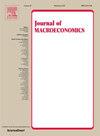财政规则能改善发展中国家银行体系的稳定性吗?
IF 1.5
3区 经济学
Q3 ECONOMICS
引用次数: 0
摘要
本文研究了发展中国家采用财政规则对银行体系稳定性的影响。通过对1990年至2020年期间62个发展中经济体的调查,我们评估了采用财政规则是否有助于降低银行不良贷款水平(银行脆弱性的一个关键指标)。分析依靠熵平衡来确保治疗组和对照组之间的协变量平衡。结果表明,财政规则的采用显著降低了不良贷款率,平均处理效果约为0.85个百分点。该研究确定了多种传导渠道——主权信用评级、减少收入不平等和宏观经济稳定——财政规则通过这些渠道加强了银行业的稳定性。异质性分析表明,影响因规则的类型和持续时间以及结构性金融特征而异。本研究通过将财政规则的作用扩展到债务和赤字控制之外,将其构建为财政和经济脆弱背景下金融稳定的制度支柱,从而为文献做出了贡献。本文章由计算机程序翻译,如有差异,请以英文原文为准。
Can fiscal rules improve banking system stability in developing countries?
This paper investigates the impact of fiscal rule adoption on banking system stability in developing countries. Using a panel of 62 developing economies over the period 1990–2020, we assess whether adopting a fiscal rule contributes to reducing the level of bank nonperforming loans, a key indicator of banking vulnerability. The analysis relies on entropy balancing to ensure covariates balance between treated and control groups. Results indicate that the adoption of fiscal rules significantly reduces the ratio of nonperforming loans, with an average treatment effect of approximately 0.85 percentage points. The study identifies multiple transmission channels—sovereign credit ratings, income inequality reduction, and macroeconomic stabilization—through which fiscal rules strengthen banking stability. Heterogeneity analysis reveals that the effect varies by the type and duration of the rule and by structural financial characteristics. This research contributes to the literature by extending the role of fiscal rules beyond debt and deficit control, framing them as institutional anchors for financial stability in fiscally and economically vulnerable contexts.
求助全文
通过发布文献求助,成功后即可免费获取论文全文。
去求助
来源期刊

Journal of Macroeconomics
ECONOMICS-
CiteScore
2.50
自引率
7.10%
发文量
53
审稿时长
76 days
期刊介绍:
Since its inception in 1979, the Journal of Macroeconomics has published theoretical and empirical articles that span the entire range of macroeconomics and monetary economics. More specifically, the editors encourage the submission of high quality papers that are concerned with the theoretical or empirical aspects of the following broadly defined topics: economic growth, economic fluctuations, the effects of monetary and fiscal policy, the political aspects of macroeconomics, exchange rate determination and other elements of open economy macroeconomics, the macroeconomics of income inequality, and macroeconomic forecasting.
 求助内容:
求助内容: 应助结果提醒方式:
应助结果提醒方式:


